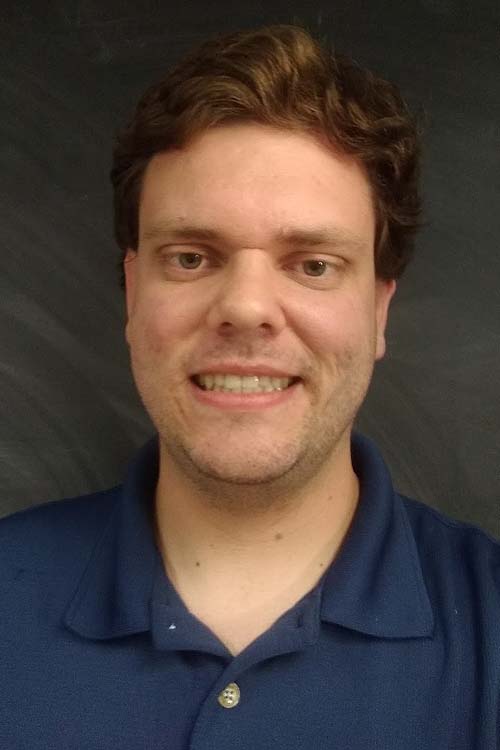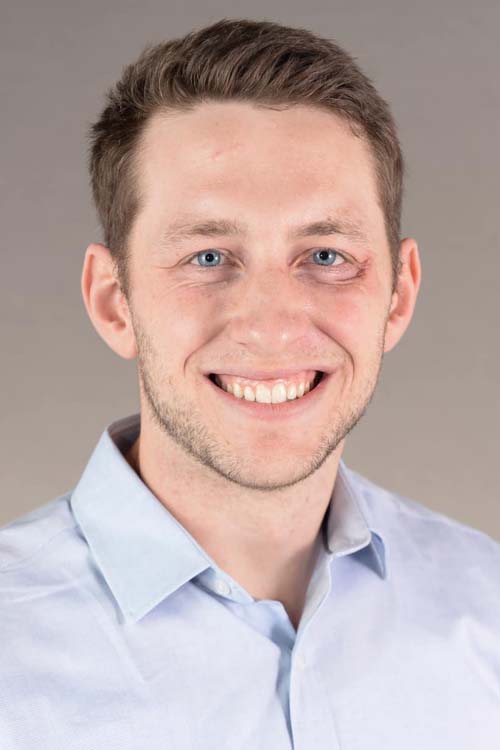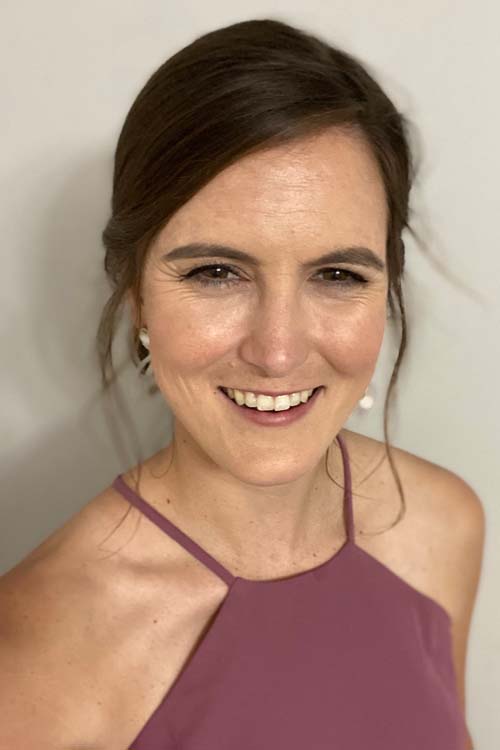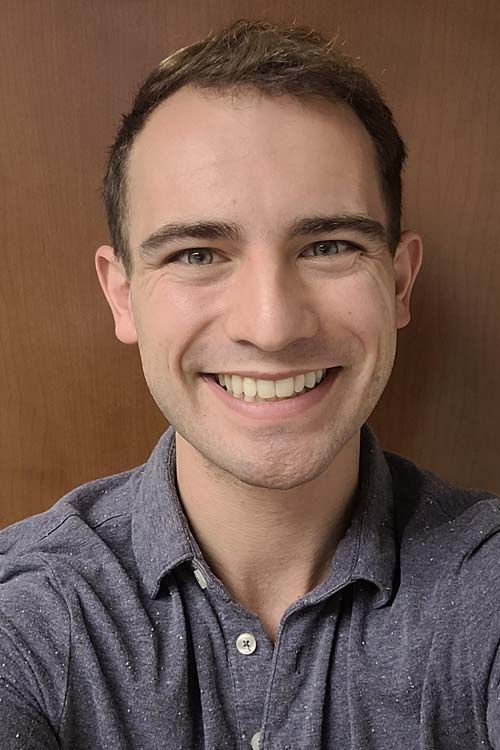Congratulations to Our 2021 PhD Graduates!
Congratulations to our 2021 PhD graduates, Tavish Dunn, Ian Grigsby, Alexandra Pasi, Taylor Poe, and Jack Rebrovich. Continue reading to hear more about their time at Baylor and their plans for the future. You may click on any of the names below to jump to the new graduate of your choice.
Tavish Dunn
 I first heard of Baylor while at California Lutheran University. I had been interested in math for a long time, but I wasn’t quite sure what I wanted to do with it. After being exposed to interesting math questions, I decided pursuing a PhD would allow me the opportunity to dive deeper into mathematics and tackle open problems.
I first heard of Baylor while at California Lutheran University. I had been interested in math for a long time, but I wasn’t quite sure what I wanted to do with it. After being exposed to interesting math questions, I decided pursuing a PhD would allow me the opportunity to dive deeper into mathematics and tackle open problems.
After I applied to Baylor, I received a call from Dr. Sepanski, in which he told me about the program and offered me the chance to visit the campus. I saw a strong sense of community in which the faculty looked out for the well-being of the students, and the graduate students helped each other, whether in class, in teaching, or just hanging out. I knew this was a collaborative environment in which I would thrive and decided to come to Baylor.
Over the past few years, I have done research with Dr. Ryden in generalized inverse limits, focusing on inverse limits of set-valued bonding functions with an appropriate notion of the intermediate value property. This allows us to capture some of the structure of classical inverse limits, which use continuous bonding functions to “glue” different spaces together to make exotic spaces, and to construct a bridge between continuum theory and dynamical systems. Dr. Ryden’s attention to detail and supportiveness have been invaluable for my growth as a researcher.
While I had no experience teaching prior to graduate school, the support of my advisors and colleagues helped me see what an exciting experience it was. I taught many first-year courses and worked with students who were adjusting to the pace of college life, some of which would describe themselves to me as “not a math person”. Working with them and watching them grow and start to see mathematics as a subject they can understand has been a consistent joy in my time teaching.
After graduation, I will be starting as a Visiting Assistant Professor at Oxford College of Emory University. I am blessed to have been at Baylor for graduate school. Sic ‘Em Bears!
- Tavish Dunn
Ian Grigsby
 I first heard of Baylor from my mathematics professor at Buena Vista University in Storm Lake, Iowa, Gail Hartsock (a Baylor alum herself!). Having never set foot in Texas, I was unsure of what to make of her idea that I apply for the mathematics graduate program here. On faith in her judgement alone, I did so. It turned out to be a life-changing decision.
I first heard of Baylor from my mathematics professor at Buena Vista University in Storm Lake, Iowa, Gail Hartsock (a Baylor alum herself!). Having never set foot in Texas, I was unsure of what to make of her idea that I apply for the mathematics graduate program here. On faith in her judgement alone, I did so. It turned out to be a life-changing decision.
Here at Baylor University, I have had the opportunity to grow in mathematics beyond my wildest dreams. Coming from a smaller institution where I was very much focused on my pitching statistics, I knew that I would need to put in the work to be successful here. Professors such as Dr. Markus Hunziker, Dr. William Brian (a postdoc at the time, now an Assistant Professor at UNC Charlotte), and Dr. John Davis all put my fears aside with their expert instruction, as all three were always open for my questions.
Ultimately topological dynamics has called my name. I have been doing research with Dr. Jonathan Meddaugh for the last couple of years. We work on the shadowing property on Fréchet spaces, which are generalizations of Banach spaces. The presence of this property allows us to know that approximate orbits of a system (think of numerically computed orbits with rounding errors at each step) are uniformly traced by a true orbit of the system.
While at Baylor, I have had the privilege of teaching many first-year undergraduate courses, such as Business Precalculus and Calculus 1. This is where I have found my true passion: changing minds on the subject of mathematics. The ultimate job satisfaction to me comes from a student entering the classroom on the first day professing that “they are not a math person,” only to have them walk out of the final with a new perspective on mathematics, knowing that while it may not be easy, it is a concept that they can grasp.
Despite all of the above, I would not have had the complete experience at Baylor if I had not spent time outside of my studies in the community. I have had the pleasure of serving as the AMS Graduate Chapter President for two years, been involved in the Graduate Student Association, and have taken up Brazilian Jiu-Jitsu in my time in Waco. Most importantly, I met my wife while in Waco. Although she is a Texas Tech graduate, I even convinced her to hold the ceremony on campus!
 Photo credit: Mikayla Dawn Photography
Photo credit: Mikayla Dawn Photography
After graduation, I will be starting as a lecturer at UNT-Dallas. I would not be where I am today if it weren’t for the family that I have found here at Baylor University. I’ll always be a Baylor Bear at heart!
- Ian Grigsby
Alexandra Pasi
 I've always been driven by interesting problems, and I've been fortunate to stumble into exciting collaborations and discoveries in their pursuit. I decided to do a PhD because I believed it would provide the best setting in which to explore interesting research questions, but I was concerned about finding an institution with a supportive graduate culture. When I expressed these concerns to my undergraduate advisors, they told me I should apply to Baylor, as the department here was friendly and collaborative.
I've always been driven by interesting problems, and I've been fortunate to stumble into exciting collaborations and discoveries in their pursuit. I decided to do a PhD because I believed it would provide the best setting in which to explore interesting research questions, but I was concerned about finding an institution with a supportive graduate culture. When I expressed these concerns to my undergraduate advisors, they told me I should apply to Baylor, as the department here was friendly and collaborative.
My original plan for graduate school had been to study number theory, but during the summer after I completed my Bachelor's, I became deeply enthralled with logic and mathematical foundations. So the next spring when I first spoke to Dr. Sepanski about research at Baylor, I asked whether anyone in the department did work in logic. "You'll want Daniel Herden," he told me definitively.
Luckily, I had my Advanced Algebra course with Dr. Herden my first semester here, so I had a chance very early on to get to know him and his approach to mathematics. It was apparent that he had a meticulously unforgiving eye for detail, but also a love for new and creative approaches and perspectives, and he was more than willing to engage with me in wildly abstract philosophical discourse. He was hesitant, however, when I told him that I wanted to do a dissertation in foundations, cautioning me that the learning curve for these topics was quite steep. He recommended a few texts for me to read to get a better sense of what the material was like, and when I returned undeterred the next semester, he let me in on an exciting (but orphaned) project idea which formed the core of my dissertation research. The project proposal was just the kind of recklessly interdisciplinary, speculative, and open-ended expedition into the mathematical wilderness I'd come to graduate school for.
The project aimed to build a bridge between algebra and set-theory using a technique called forcing. It was inspired by, among other things, the resolution of the infamous Whitehead Problem as undecidable. Our seminars on forcing included Dr. Alexander Pruss of the philosophy department, and featured conversations on mathematical truth and provability which frequently bordered on the absurd and occasionally swan-dived with full mathematical rigor into the deep-end of absurdity. I mean that in the best of ways, as many mathematicians would surely understand.
The project has proved itself an enormous success, with plenty of surprises along the way. It resulted in the development of a novel proof technique for use in abelian group theory, the identification and characterization of a certain class of groups, and novel forcings which can be readily used by algebraists. Perhaps most crucially, it provides compelling evidence of a closer relationship between set-theory and algebra than is commonly acknowledged, and provides tools for the interested mathematician to further explore this fascinating intersection. I look forward to continuing collaboration with Dr. Herden and others on expanding these results and insights in the years to come.
- Alexandra Pasi
Taylor Poe
 I began my college career at Mississippi College undecided in my major, but through the wisdom and guidance of several undergrad mentors, I discovered that I really enjoyed math. These mentors also gave me opportunities to substitute teach and tutor, which I loved so much that I began to wonder if the Lord might be calling me to teach. As graduation neared, I began considering different graduate programs. Initially, I did not consider applying to Baylor, but when I received an email offering a free application, I decided to apply.
I began my college career at Mississippi College undecided in my major, but through the wisdom and guidance of several undergrad mentors, I discovered that I really enjoyed math. These mentors also gave me opportunities to substitute teach and tutor, which I loved so much that I began to wonder if the Lord might be calling me to teach. As graduation neared, I began considering different graduate programs. Initially, I did not consider applying to Baylor, but when I received an email offering a free application, I decided to apply.
Several weeks later, I received a call from Dr. Sepanski. He described Baylor’s program and invited me to visit. At that visit, I saw much of the same Christian comradery among the graduate students and professors that I had enjoyed at MC. I also saw how the department developed the students as researchers while allowing graduate students to simultaneously grow in their teaching. After many weeks of prayer, I committed to come to Baylor.
The first semester that I taught at Baylor, the Lord really confirmed the calling He put on my life to teach and mentor students. I have learned so much through my experiences teaching at Baylor, the guidance of my teaching mentors, and opportunities like the TeaCHE program. I have also been grateful for the opportunity to mentor several students, even after they finish my class. I will certainly miss these special Baylor students.
Prior to coming to Baylor, I had no experience with math research. My advisors, Dr. Andrei Martinez-Finkelshtein and Dr. Brian Simanek, have expertly and patiently guided me in research projects. Our work currently focuses on characterizing Poncelet ellipses with given foci using orthogonal polynomials on the unit circle, finite Blaschke products, and the numerical ranges of a particular class of matrices.
These experiences have grown and challenged me in ways I could not have imagined when I came to Baylor four years ago. I am also so thankful for the other graduate students, the professors, and the Baylor undergraduate students and alumni who have encouraged and supported me through the program. In the fall, I will be returning to Mississippi College in an assistant professor position, and I am so grateful the Lord opened up this opportunity to teach at the place that has shaped me in so many ways.
- Taylor Poe
Jack Rebrovich
 I came to Baylor from Angelo State University where I initially went to study mathematics with the intent to become certified to teach high school. However, through my time in the Honors Program and with the PURE Math REU in Hawaii, I came to love the idea of learning more about math. With that in mind, I started planning on attending graduate school by participating in research opportunities. I completed an undergraduate Honors thesis under Dr. Susan Abernathy connecting knot invariants to each other as well as their applications to DNA and cancer research.
I came to Baylor from Angelo State University where I initially went to study mathematics with the intent to become certified to teach high school. However, through my time in the Honors Program and with the PURE Math REU in Hawaii, I came to love the idea of learning more about math. With that in mind, I started planning on attending graduate school by participating in research opportunities. I completed an undergraduate Honors thesis under Dr. Susan Abernathy connecting knot invariants to each other as well as their applications to DNA and cancer research.
When it came time to apply to graduate school, I felt called to Baylor. The department fit everything I was looking for with a loving, co-operative faculty, a cohort of graduate students that made me feel welcomed, and classes that allowed me to grow as a mathematician. The Dr. Pepper float runs every Tuesday were also a big factor!!
My favorite part about Baylor is the opportunities I have been given to teach. I have loved being able to gain experience teaching while being a Ph.D. student. Having the guidance and ability to observe the many excellent professors in our department has allowed me to grow my ability and style of teaching. I have always felt supported by the department in my endeavors to better my teaching whether that is by attending an Inquiry Based Learning Conference or experimenting with different methods of delivery of instruction.
My research, under the direction of Dr. Daniel Herden and Dr. Manfred Dugas, concerns classifying the automorphisms of the group of units of a specific finitary incidence algebra. Dr. Herden and Dr. Dugas have always been very supportive and the experience of researching under their tutelage has been invaluable.
I was born and raised in Texas, and with all of my extended family living in Waco, having the opportunity to attend Baylor for graduate school felt like coming home. My time here has been inspirational and I am so blessed to have been a graduate student at Baylor. Sic ’Em Bears!
- Jack Rebrovich